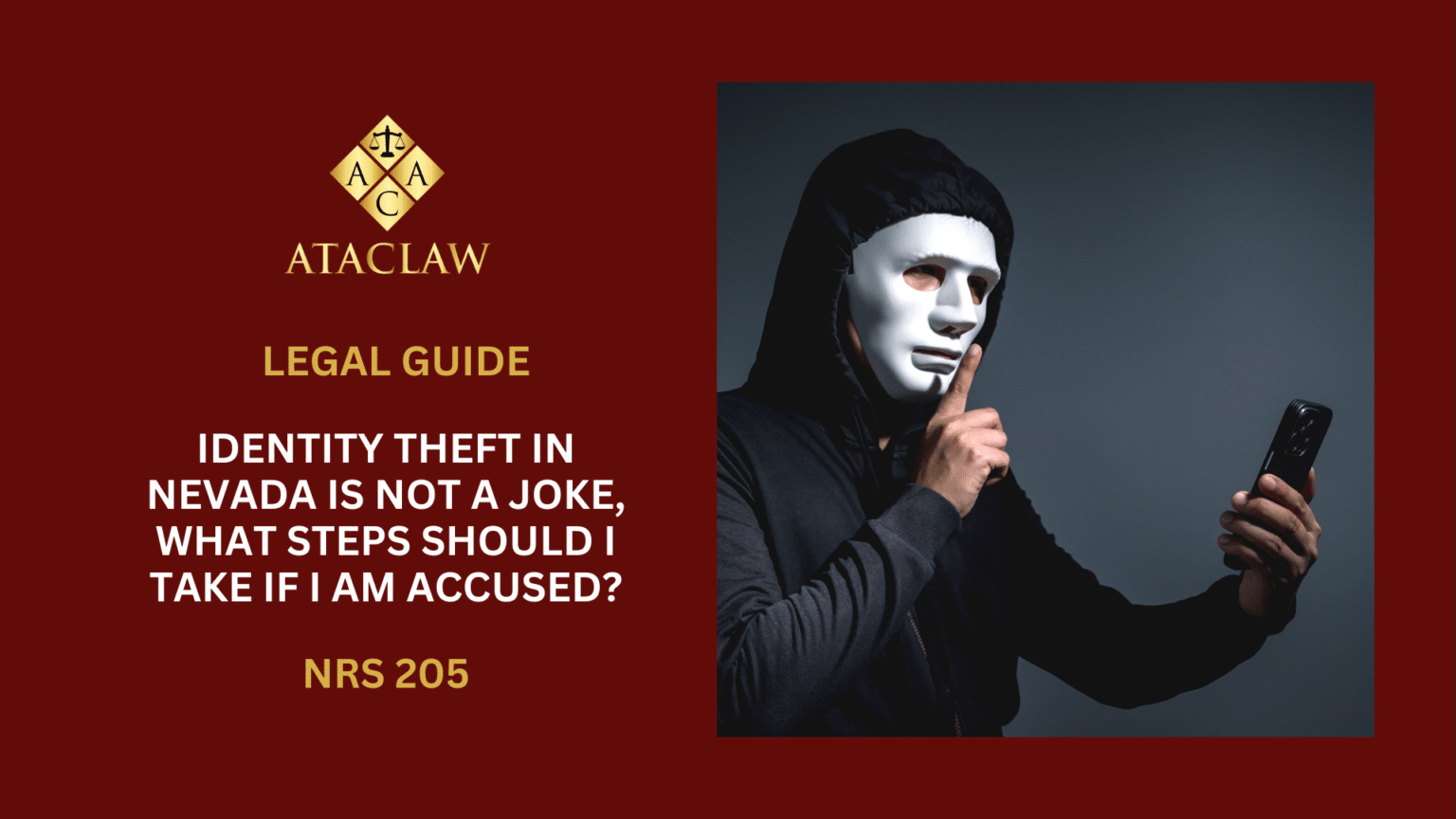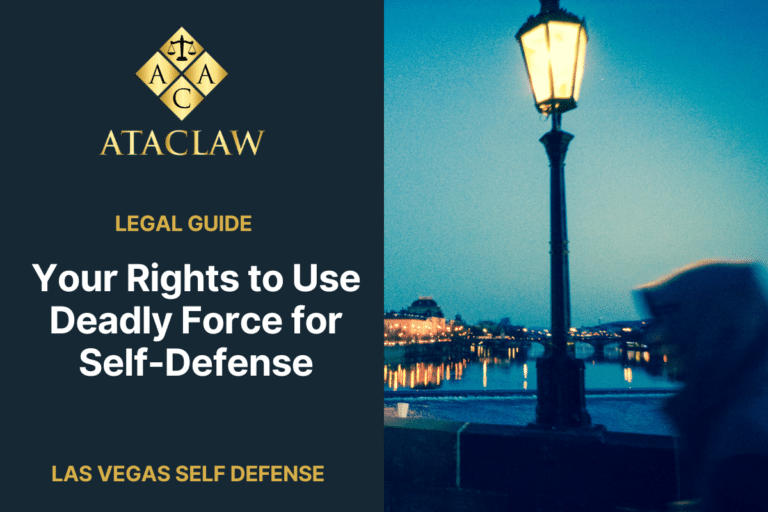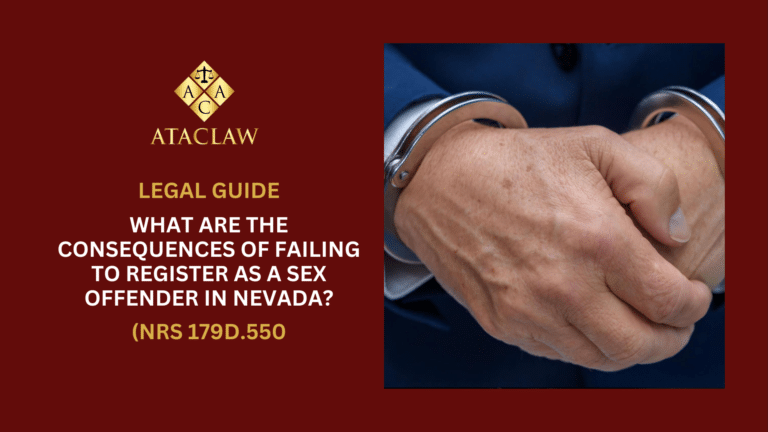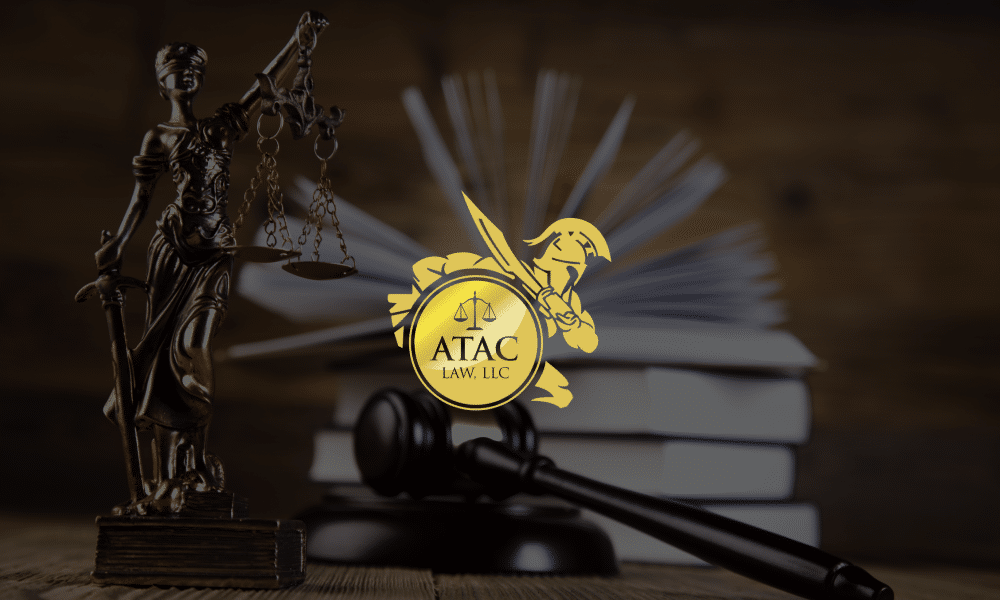In Nevada, identity theft is a rapidly growing crime that affects millions of Americans each year, leading to financial loss and personal distress. In Las Vegas, Nevada, the law takes a firm stance against this intrusive crime. ATAC LAW is here to guide you through the complexities of identity theft laws and penalties in Nevada, ensuring you’re informed and protected.
Nevada’s legal framework classifies identity theft as the unauthorized use of another person’s identifying information to either inflict harm or secure an unentitled benefit. Reflecting the severity of this crime, perpetrators face harsh penalties, with serious offenses prosecuted as category B felonies. These entail 1 to 20 years in prison, fines reaching $100,000, and mandatory restitution to the victim.
What Does Identity Theft Mean for Nevada Residents?
Identity theft in the city of Las Vegas, Nevada, is defined by the unlawful use of someone else’s personal information or identity. It encompasses actions that can harm the individual or entail unlawful conduct.
1. The Dangers of Counterfeit IDs in Las Vegas (NRS 205.460 & NRS 205.465)
Nevadan legislation firmly prohibits the possession or distribution of any personal identification intended to falsely represent one’s identity. Here are a few typical scenarios where counterfeit IDs pose legal trouble:
- Individuals under the legal age procuring a doctored driver’s license to purchase alcohol or cannabis;
- Undocumented individuals carrying counterfeit naturalization documents to obtain employment reserved for legal residents;
- Civilians flaunting false military IDs to claim government veteran-related benefits;
- Young people owning deceitful IDs in an effort to join age-restricted organizations,such as AARP;
- Trafficking or distributing fake identification to others.
Holding information from at least five different individuals could imply an intent to defraud, but defendants can challenge this in court.
2. Misappropriation of Personal Identifiable Data (NRS 205.463)
It’s deemed unlawful in Nevada to exploit another’s personal information in ways that:
- Inflict harm upon someone else;
- Illicitly access more personal data without consent;
- Retrieve the person’s private records, such as communication or financial transactions, without approval; or
- Engage in crimes like fraudulently obtaining credit.
Using a person’s ID to evade prosecution is also a breach of NRS 205.463. Identifiable individual data includes names, driver’s license information, social security, banking details, birth dates, biometric identifiers, electronic signatures, communication passwords, professional licenses, and utility account numbers. As an illustration, this could involve making unauthorized purchases with another person’s payment method.
3. The Consequences of Falsely Assuming Another’s Identity (NRS 205.450)
This offense arises when an individual wrongfully represents themselves as another during specific activities such as:
- Marrying,
- Engaging in real estate dealings,
- Admitting to crimes or civil judgements,
- Serving as bail or acting in a legal proceeding, or
- Performing any act within a lawsuit that negatively influences someone’s financial standing.
This statute refers only to impersonating a real person but is not applicable to fictitious individuals.
What Are the Legal Consequences of Identity Theft in Nevada?
Identity theft in Las Vegas can have severe repercussions, impacting not only the individuals whose identities are abused but also posing substantial legal challenges and punishments for those accused of the crime. Here’s a breakdown of the various penalties one might face for identity theft in Nevada:
Category B Felonies:
The gravest offenses of identity theft may lead to:
- Imprisonment ranging from 1 to 20 years;
- Monetary compensation to the victim(s) for any losses incurred; and
- Possible fines reaching up to $100,000.
If the victim was 60 years or older or classified as “vulnerable” due to mental or physical challenges, the mandatory minimum prison time increases to three years.
Specific Identity Theft Offenses and Corresponding Sentences:
1. Possessing a Fraudulent ID for Age-restricted Activities (NRS 205.460):
- Misdemeanor penalty
- Maximum of 6 months in jail and/or
- Fines up to $1,000
2. Distribution of a Phony ID for Age-restricted Access (NRS 205.460):
- Gross misdemeanor sentence
- Up to 364 days in jail and/or
- Fines up to $2,000
3. Possessing Falsified IDs for Synthetic Identity Establishment (NRS 205.465):
- Category E felony charge
- Probation with a suspended sentence, potentially including up to 1 year of jail time, but with previous felonies, could lead to:
- 1 to 4 years in prison and/or
- Fines up to $5,000
4. Dealing or Producing Forged IDs and Using an ID for Deception or Avoiding Law (NRS 205.463 & 205.465) or False Pretense (NRS 205.450):
- Classified as a Category C felony:
- 1 to 5 years of imprisonment and
- Fines up to $10,000
5. Operating with Another’s ID for Unlawful Acts (NRS 205.463) or Affecting People through Misuse of Personal Data (NRS 205.465):
- Classed under Category B felony:
- 1 to 20 years behind bars and
- Fines reaching $100,000
For offenses committed under NRS 205.263 involving victims over 60 years old, disabled individuals, or multiple individuals’ IDs, or resulting in substantial financial loss, minimum sentencing is a compulsory three years.
Under federal regulations, identity theft is sanctioned by up to 15 years in prison and fines of $250,000, as specified in the Identity Theft and Assumption Deterrence Act of 1998. The Federal Trade Commission (FTC) provides more information on these federal penalties.
It’s crucial to remember that a felony conviction in Nevada leads to the loss of firearm privileges. Regaining these rights is possible only through a pardon in the state.
What Are the Consequences of ID Theft Charges for Immigrants?
Immigrant outcomes in ID theft cases can vary, with some courts not considering it a deportable offense. Non-U.S. residents charged with a crime should seek skilled legal representation promptly. A proficient lawyer may succeed in having the charges dismissed or negotiated down to an offense that does not carry the risk of deportation.
Those accused of identity theft in Las Vegas should seek capable legal counsel like ATAC LAW for guidance and defense, while victims must understand their rights to seek restitution and protect their personal information.
How Can I Challenge Identity Theft Charges in Nevada?
Battling accusations of identity theft in Las Vegas, Nevada hinges upon demonstrating that any actions taken were not done so with fraudulent intent. In Nevada, the law recognizes that identity theft requires intentionality, and accidental actions do not meet this threshold:
Let’s consider a scenario: Emily and her housemate Laura use the same computer and both have online shopping accounts for a popular retailer. Emily logs into the retailer’s website, unknowingly using Laura’s saved login information and, believing she was on her own account, proceeds to purchase $1,000 worth of apparel. When Laura discovers the charge and reports it to the Las Vegas Metropolitan Police Department (LVMPD), it is evident that Emily didn’t realize she wasn’t on her own account. Under these circumstances, Emily has not committed a criminal offense because she lacked malicious intent.
Even though Emily’s actions are not criminal under Nevada law, Laura, who feels victimized, could potentially take civil action, and Emily might be responsible for reimbinding Laura for the expenses incurred.
Another defense strategy in the face of identity theft accusations is to contest the evidence’s legality, focusing on the Fourth Amendment’s protection against unlawful search and seizure. This can include evidence such as credit reports and financial records which may have been gathered improperly by law enforcement.
Should evidence be argued successfully as inadmissible because it was obtained through measures violating constitutional rights, the court may exclude it from consideration. With critical evidence dismissed, prosecutors might find themselves with insufficient proof to sustain the case. The outcome could result in negotiations for a plea deal more favorable to the defendant or possibly in the dismissal of all charges.
When Can You Seal a Criminal Record for Disturbing a Meeting in Nevada?
In Nevada, if you’re convicted of disturbing a meeting, you’re eligible to have your criminal record sealed one year after the case concludes. If the charges were dismissed, there’s no waiting period, allowing you to apply for a record seal right away.
What Steps Should I Take if I’m a Victim of Identity Theft in Nevada?
If you fall prey to identity theft in Nevada, it’s imperative to act swiftly to safeguard your finances and your credit score. Here’s a five-step action plan to follow:
- Inspect Credit Reports and Bank Statements: Begin by thoroughly reviewing your credit reports and bank statements. Look for any transactions or activities you don’t recognize.
- File a Complaint with the FTC: Take the time to report the identity theft to the Federal Trade Commission (FTC). This can be done online and will help in legally establishing your case.
- Notify Local Law Enforcement: Document the identity theft with your local police department. For residents of Las Vegas or North Las Vegas, reports can be submitted through their respective city websites.
- Initiate a Fraud Alert: Reach out to the major credit bureaus and request to put a fraud alert on your credit reports. This notifies creditors to take extra steps in verifying identities before extending credit.
- Freeze Your Credit: Take the additional security step of freezing your credit with all three credit bureaus—Equifax, Experian, and TransUnion—preventing new accounts from being opened in your name without your direct consent.
By completing these steps, victims of identity theft can create significant barriers against further fraudulent activities and begin the recovery process. It’s crucial to maintain a record of all communications and actions taken, as they may be needed for any future legal proceedings or to rectify credit report inaccuracies.
Is It Possible to Seal an Identity Theft Conviction Record?
Yes, individuals can seal their identity theft conviction records in Nevada, but there are mandatory waiting periods which vary based on the category of the felony:
- Category B felony: Waiting period of 5 years post-case conclusion.
- Category C felony: 5-year waiting period following case closure.
- Category D felony: Wait for 5 years after the case concludes.
- Category E felony: Waiting period is 2 years post-case conclusion.
- Gross misdemeanor: 2-year waiting period following the case’s conclusion.
- Misdemeanor: 1 year after the case ends.
If the case is dismissed, there’s no waiting period to apply for a record seal.
Sealing your record is crucial as soon as eligible. An identity theft conviction on your record can significantly hinder employment opportunities.
Can You Explain the Charges Related to Identity Theft?
Identity theft often brings associated offenses to light, such as:
1. Forgery
Engaging in the act of forgery means creating or altering documents with the intent to deceive. This crime, categorized as a category D felony, comes with similar punishments, namely:
- 1 to 4 years of imprisonment,
- Fines up to $5,000, depending on judicial discretion, and
- The necessity to provide restitution when applicable.
2. Credit Card Fraud
Credit card fraud involves the unauthorized use or acquisition of someone else’s credit card information for personal gain. This could range from charging purchases to someone else’s account without consent, to providing false information on a credit card application. As a general rule, credit card fraud is dealt with as a category D felony, which could result in:
- Imprisonment ranging from 1 to 4 years,
- Possible fines up to $5,000, based on the judge’s decision, and
- The obligation to pay back the stolen funds, if applicable.
3. Counterfeiting Seals
The creation or misuse of counterfeit official seals also falls under category D felony offenses. This includes using genuine seals without authorization, punishable by:
- A prison term of 1 to 4 years,
- Fines reaching up to $5,000, at the discretion of the court.
Changing names, as requested: Let’s say John used his roommate’s credit card to buy electronics without permission, or Alice submitted a credit card application under a false identity. These are textbook cases of credit card fraud that legal experts at ATAC LAW frequently address, offering defense strategies for those accused.
For further legal assistance and to discuss your case with an expert, don’t hesitate to contact ATAC LAW.




